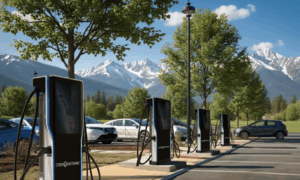
Home / EV Charging News / Electric Cars and Charging Station Grid Resilience
The widespread adoption of electric vehicles (EVs) brings to light the importance of ensuring the resilience of charging infrastructure. This article explores the strategies and technologies aimed at enhancing the resilience of charging station grids, especially during grid outages and disruptions.
As more drivers transition to electric cars, the dependence on charging infrastructure becomes paramount. The resilience of charging grids is crucial to guarantee uninterrupted access to charging stations, ensuring the continued viability of electric mobility even in challenging circumstances.
Grid disruptions, whether caused by natural disasters, technical failures, or cyberattacks, can impact the availability of electric car charging stations. Developing strategies to mitigate these disruptions is essential for fostering confidence among electric vehicle owners and encouraging broader EV adoption.
Incorporating energy storage solutions, such as advanced batteries, into charging station infrastructure provides a buffer during grid outages. Stored energy can be utilized to maintain essential services, allowing charging stations to operate independently for a limited duration, ensuring continuous service to electric vehicle users.
Microgrids, localized and independent energy systems, offer a decentralized approach to charging infrastructure. By integrating charging stations with microgrids, they can continue to function autonomously even when the main power grid is affected. This approach enhances resilience and contributes to the overall reliability of electric car charging networks.
Smart grid technologies enable effective demand response and load management. During peak demand or grid instability, charging stations can dynamically adjust their operations. This not only ensures grid stability but also prevents overloading, enhancing the overall resilience of the charging infrastructure.
Real-time grid monitoring, coupled with predictive maintenance using data analytics, is instrumental in identifying potential issues before they lead to disruptions. Proactive measures can be taken to address issues, reducing downtime and ensuring the continuous availability of electric car charging stations.
Incorporating backup power requirements into regulations and standards ensures that charging stations are equipped to handle grid outages. Mandating the inclusion of energy storage solutions or alternative power sources becomes a fundamental aspect of ensuring the resilience of charging infrastructure.
Governments can provide incentives for the implementation of resilient charging infrastructure. Financial support, tax benefits, and regulatory advantages can encourage businesses and operators to invest in technologies that enhance the resilience of electric car charging networks.
Collaboration between public and private entities is essential for building resilient charging infrastructure. Public-private partnerships can facilitate the sharing of resources, expertise, and data, contributing to a more robust and interconnected electric vehicle charging network.
Developing emergency preparedness plans and providing training for operators and maintenance personnel ensures a swift response to grid disruptions. Well-prepared teams can efficiently address issues, minimizing downtime and optimizing the recovery of charging infrastructure following disruptions.
California, prone to wildfires, has implemented measures to enhance grid resilience during emergencies. By integrating energy storage solutions, microgrids, and implementing robust emergency response plans, the state ensures the continued operation of electric car charging stations even in challenging fire-prone conditions.
European countries, facing diverse climate challenges, are investing in climate-resilient electric vehicle infrastructure. By incorporating smart grid technologies, stringent backup power requirements, and collaborative efforts between countries, Europe is creating a framework for resilient electric car charging networks.
Embracing a long-term vision for resilient charging infrastructure involves staying at the forefront of technological advancements. Continuous research and development will lead to innovations that further enhance the reliability and adaptability of charging stations, making them more resilient to a variety of challenges.
Designing charging infrastructure with scalability in mind ensures that it can evolve alongside the growing demands of electric mobility. Future-ready designs accommodate new technologies and changing grid dynamics, providing a foundation for a charging ecosystem that remains resilient and responsive to emerging challenges.
Establishing international standards for charging infrastructure promotes interoperability and resilience on a global scale. Electric vehicle manufacturers, charging station operators, and governments can collaborate to create a unified framework, ensuring that charging stations seamlessly function across different regions and under diverse conditions.
Facilitating knowledge sharing and the exchange of best practices is crucial for building a resilient charging ecosystem. Collaborative initiatives, forums, and conferences enable stakeholders to learn from each other’s experiences, fostering a global community committed to enhancing the resilience of electric car charging infrastructure.
Educating electric vehicle users about the resilience of charging infrastructure is essential. Communicating the measures in place to ensure continuous service during disruptions, along with providing guidance on emergency protocols, builds trust and confidence in the reliability of electric car charging stations.
In regions prone to specific challenges like natural disasters, promoting disaster preparedness among electric vehicle owners becomes a proactive measure. Emergency evacuation plans, alternative charging routes, and real-time communication during crises contribute to a resilient charging ecosystem that prioritizes user safety.
Investing in real-time grid monitoring technologies enhances the adaptive capabilities of charging infrastructure. Continuous data analysis allows for immediate response to grid fluctuations, optimizing charging station operations and minimizing the impact of disruptions on electric vehicle users.
Developing adaptive strategies for unforeseen events requires a dynamic approach to resilience. Scenario planning, risk assessments, and the ability to implement rapid changes based on real-time information contribute to a charging ecosystem that can swiftly navigate through unexpected challenges.
Resilience should be seamlessly integrated into the broader framework of sustainable mobility. As electric vehicles play a central role in reducing carbon emissions and environmental impact, resilient charging infrastructure ensures that the transition to sustainable transportation is not only environmentally friendly but also reliable and robust.
A commitment to continuous improvement is at the heart of building a resilient charging ecosystem. Regular evaluations, feedback mechanisms, and the incorporation of lessons learned from disruptions contribute to an adaptive and ever-improving infrastructure that stands the test of time.
In conclusion, the journey towards a resilient charging ecosystem is an ongoing process that requires collaboration, innovation, and a shared commitment to sustainability. As electric vehicles become an integral part of our transportation landscape, the resilience of charging infrastructure becomes a cornerstone in shaping a future where clean and reliable mobility is accessible to all. By navigating challenges and embracing adaptive strategies, the electric car charging ecosystem is poised to power progress towards a resilient and sustainable tomorrow.



